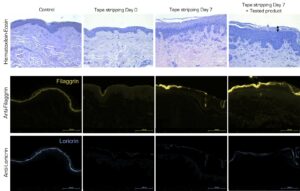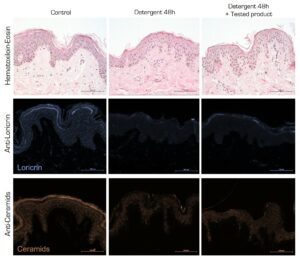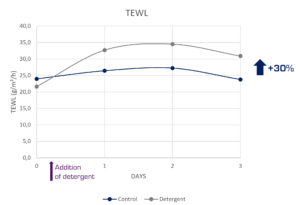Tissue regeneration on ex vivo human skin model
Human skin has excellent regenerative capacities that ageing or external stress can alter by ageing or external stress. In order to test ingredients or products capable of improving this tissue regeneration; it is necessary to develop adapted ex vivo human skin models. These skin models not only allow a better understanding of the biological phenomena involved, but also better prediction of the in vivo effects.
Alteration of the barrier function and loss of hydration are recurrent cutaneous phenomena in fragile skin. Therefore it is necessary to prevent these phenomena to preserve the health of the skin.
We offer two ex vivo skin models that show the different characteristic alterations of skin dryness:
– Alteration of the stratum corneum
– Decrease in the expression of essential stratum corneum markers
– Increased transepidermal water loss (TEWL)
Tissue regeneration in skin model after stripping
The skin explants were successively stripped until almost all the stratum corneum was removed. We then treated the skin models for 7 days with or without a formulated cosmetic active ingredient under development.
Skin barrier function impairment and recovery

Haematoxylin/eosin staining and specific labelling of Filaggrin in yellow and Loricrin in blue in untreated, striped skin, exposed or unexposed to a test product.
After 7 days, the untreated skin shows a very immature looking stratum corneum which contains a parakeratosis (incomplete maturation of epidermal keratinocytes, resulting in abnormal retention of nuclei in the stratum corneum).
In contrast, treatment with the test product allows a reconstruction of the upper layers of the epidermis and reactivation of the expression of essential markers of the stratum corneum.
Tissue regeneration in skin model after a detergent application
The skin explants were exposed to a detergent for several hours. We then treated the skin models for 2 or 3 days with or without a formulated cosmetic active ingredient under development.
Skin barrier function impairment and recovery

Haematoxylin/eosin staining and specific labelling of Loricrin in blue and Ceramids in orange in untreated or skin exposed to a detergent, treated or not with to a test product.
After 2 days, the untreated skin shows a strong deterioration of the stratum corneum and a marked decrease of its biomarkers.
On the other hand, skin that has received the test product shows a slight improvement in the reconstruction of the stratum corneum and in the expression of its essential biomarkers.
Increased dehydration

Measurement of the Trans epidermal water loss with Aquaflux on human skin explants
Detergent-exposed skin explants show a significant increase in TEWL. This effect may be reversed by a moisturizer or repairing products.
To conclude
These ex vivo human skin models are ideal to study the effect of topical treatments on:
– Tissue regeneration
– Barrier function recovery
– Moisturizing properties
Don’t hesitate to contact us for more information on our human skin models and product testing. You can also share your projects with us so that we can set up a study adapted to your needs.

